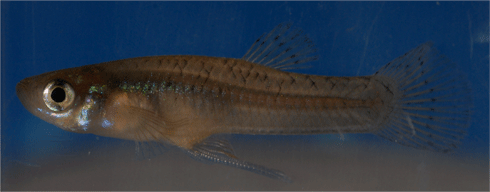
|
Published: 6 August 2012
Higher temperatures change predator-prey relations
A species’ ability to adapt to climate change may be less important than how climate change affects its relationship with other species and the ecosystem, according to new research.

|
|
Higher temperatures, such as those predicted to arise from climate change, lead to an increase in the speed with which the mosquitofish escapes from predatory attacks. Credit:
University of Sydney
|
The study, published in Proceedings of the Royal Society B (Biological Sciences) found that temperature rises can drastically alter relationships between predator and prey, including the success of invasive species.
Professor Frank Seebacher and colleagues from the University of Sydney’s School of Biological Sciences investigated how increased temperature levels influence fish behaviour.
‘We found the higher temperature levels [that] climate change is predicted to bring about will reduce the number of attacks by the Australian bass on the mosquitofish,’ said Professor Seebacher.
‘At the same time the escape speed of the mosquitofish increased. This means the Australian bass was much less successful in catching the mosquitofish, an invasive species that is a major part of the bass diet.’
At first, as the temperature in the fish’s environment was raised, the bass made more attacks. However, as the temperature increased to the range likely to be introduced by climate change (30°C), its attack rate dropped.
‘Importantly we have shown that while the range of higher temperatures predicted to occur with climate change might not directly kill a species, the impact on its relationships with its prey can threaten it and bring about complex changes to the ecosystem,’ said Professor Seebacher.
‘What is true for these two species will be true for many more. Understanding the full impact of climate change depends on understanding these interactions and not just the likely survival of a species considered in isolation.’
In an evolutionary sense, the mosquitofish might be expected to adapt better to temperature changes than bass because it lives in a wide range of thermal conditions, from hot springs to cool mountain habitats. The bass, by contrast, is restricted to coastal areas in temperate parts of eastern Australia.
‘Interestingly while the bass experiences a much narrower and less varied range of temperatures than the mosquitofish, it was still able to spontaneously adapt to changes in temperature. So evolutionary theory alone cannot explain its response – which raises interesting questions about what mechanism it is using to cope with this environmental change.’
Source: University of Sydney



